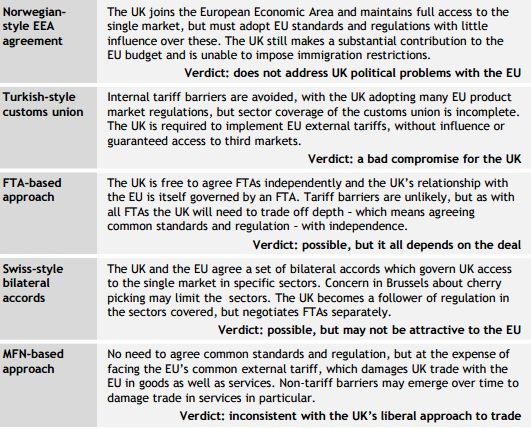Brexit Result- The Path for the UK to Leave and the Impact on the European Union
Following the UK’s vote yesterday to exit the European Union, we are left with a large degree of uncertainty on what will now follow.
The UK’s vote to leave the EU now requires the application of Article 50 of the Lisbon Treaty. This will involve the UK notifying the European Council of its intention to leave the Union, following parliamentary approval for such an act. Article 50, when applied,provides that the EU will negotiate a new agreement with the withdrawing country over two years. While the two year period can be extended by unanimous agreement, Article 50 also specifies that, when agreeing a new deal the EU acts without the involvement of the country that is leaving, meaning Britain would have little or no say in the relationship it is offered by the remaining 27 member states.
While the referendum result itself is not legally binding, it would be seen as highly unlikely that Parliament would ignore the wishes of the electorate by either refusing to make the application to withdraw or significantly delaying said application. It is unclear if the British government will apply to withdraw immediately following the Referendum result or if they will opt to wait for a number of months in order to negotiate the terms of exit with the European Union before they trigger the article 50.
What kind of deal is possible?
The hope of those advocating a Leave vote in the UK referendum would be that the UK could go on to form a relationship with the EU similar to the relationship already in place between other countries outside the EU, including Switzerland, Norway, Iceland and Liechtenstein. These countries have formed a European Free Trade Association (‘EFTA’) for the promotion of free trade and economic integration. Norway, Iceland and Liechtenstein have a joint European Economic Area (‘EEA’) Agreement with the EU while Switzerland has signed a set of bilateral agreements with the EU. However, this path is far from certain. Even if the UK were to remain a full part of the single market, it would have to accept EU regulations without any influence in setting them. It would still have to pay for access to that market, as does Norway, and could not deregulate any more that it can today.
Additionally, while the UK, would have more freedom and control over making trade agreements, it is likely that it would struggle to negotiate the same access for goods and services as it currently has under existing EU free trade agreements. US President Barack Obama has already stated that the US would not be interested in negotiating a trade deal with the UK separate to the Transatlantic Trade and Investment Partnership. Japanese Prime Minister Shinzo Abe has also gone on the record stating the UK would be less attractive to Japanese investors should an exit from the EU take place.
A report from Global Counsel on the impact of a Brexit on the EU and the UK, outlines five distinct models that may define future relationship with the EU should the UK choose to leave. (See table below)

The overall impact of the result on the EU at this point is hard to quantify. The decision of the UK to leave the EU will likely have a negative impact of the dynamic of the Union. Some of the tensions that exist within the UK also exist in other Member States, such as France.
It is also unclear how willing to negotiate other Member States will be when it comes to making deal on favourable terms of exit with the UK. The incentive for the EU will be to discourage other countries from following on the same path. For example, on the 9th May 2016, Ipsos-MORI published a poll that states nearly half of Europeans want a vote on EU membership. 45% of more than 6,000 people surveyed in Belgium, France, Germany, Hungary, Italy, Poland, Spain and Sweden said they wanted their own vote, and a third would opt to leave the EU if given the chance.

More Information:
For more information on the UK Referendum result, please contact Chambers Ireland directly or see the following resources;
Institute of International and European Affairs
British Irish Chamber of Commerce
Please note that this information is not advice, and should not be treated as such. If you have any specific questions about any matter you should consult your legal or other professional services providers.
